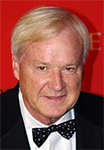The Volunteer Who Became “One of the Most Influential Observers of American Politics”*— Chris Matthews (Swaziland)
A Profile in Citizenship
by Jeremiah Norris — Colombia, 1963-65
•

photo: Wikipedia
Chris Matthews (Swaziland 1968–70) recently published a book entitled: This Country: My Life in Politics and History (2021) As one reviewer commented:
Chris “shares the many stories that show us the greatness of our nation and her people.”
And another stating:
“. . . a must read for all, no matter where you self-identify on the current political spectrum.”.
So, who is this former Volunteer that was so instrumental in green-lighting Peace Corps’ 3rd Goal while providing ‘friend and foe’ alike some great insights into the cultural values that have informed his public commentary and world view”?
After graduating from Holy Cross College in Massachusetts, Chris pursued a Ph. D. in Economics at the University of North Carolina. Then, after completing his graduate studies, served as a Peace Corps Volunteer in Swaziland. There his two years of service as a trade development officer took him to a wider world, allowing him to view his country at a distance. It opened Chris to a common humanity with people whose lives were separated from his by a continent and culture. He considered it as a “spiritual experience, like being alone in a church.” Chris had an early interest in horizons beyond his immediate sight line, actively expressing it by hitchhiking to other African countries where he could compare and contrasts them with his Peace Corps site and programs in Swaziland.
Returning home, Chris moved to Washington D. C. in the winter of 1971, and with $200 left from his Peace Corps “readjustment allowance,” began a process of knocking on doors on Capitol Hill. His goal was to become a Legislative Assistant to a US Senator. After weeks strolling the corridors of the House and Senate he managed to wrangle a job with a Senator, then thanks to him, with another Senator. These first jobs after Chris had returned from Africa would become his primer in Washington politics and how it works.
In 1974, Chris put together a campaign for Congress as a Democratic maverick. He ran against Philadelphia’s old political machine. Although he didn’t win, his grit put him on the path to a top job in the White House as a speech writer for then-President Jimmy Carter. After his defeat by Ronald Reagan for a second term, Chris became Chief of Staff to the legendary Democratic Speaker of the House, Tim O’Neill. Chris considered his time with the Speaker “as an on the job doctorate in American politics.” When the Speaker retired in 1986, Chris took a job as president and CEO of a big Washington consulting firm with a staff of 50, many of them policy experts. Though it was a highly credible “think tank,” it wasn’t for Chris.
Fortunately, a friend from The Washington Post who had been recently named Executive Editor of the San Francisco Examiner, called and asked Chris to become the newspaper’s Washington Bureau Chief. He took the job and his friend predicted that his column would quickly be syndicated nationally and he’d find himself appearing on television as a political commentator. How true when that prediction soon morphed into reality.
Chris then became a columnist and reporter for the Examiner where he covered the fall of the Berlin Wall, the first all-races election in South Africa, the Good Friday Agreement in Northern Ireland, and every American president from Reagan to George W. Bush.
Chris went on to pioneer cable news with a fast-paced no-nonsense television program. His show, “Hardball,” which debuted in 1988, would become a political institution for twenty years. The title of the show was drawn from a book he had written about real-life politics in 1988. His ambition for “Hardball” was to drill down to the truth, especially in those cases when he suspected something was being withheld. He considered it “‘a vital position to hold and he refused to abdicate it by pitching softballs to his guests.” Chris sensed that there were many viewers out there with a hot question in their heads, but what they hated was that the person sitting in his chair wouldn’t ask it. Chris found that nothing is more maddening to know that a politician is hiding something and the person tasked with getting it out of them doesn’t even try. Thus, his job on Hardball was to do what his viewers could not do. As one viewer commented to Chris: “what I like about you is you don’t let them get away with anything.”
One message that Chris managed to get across crystal clear over the decades is his passion for this country and its politics. With every twist and turn, he reveled in the democratic contest itself.
The great Washington Post editor, Ben Bradlee, best captured Chris’s effect on our nation via ”Hardball”: “Matthews writes about politics with relish, the way sportswriters cover boxing.”
What concerns Chris is that it’s not a politician or a philosophy that drives him. Rather, it’s his concern for our American system of self-government. That’s what holds his political heart. He “wants this country’s vigorous back and forth competition for ideas and ambitions to serve a great democracy and keep us together.”
Chris is a visiting professor at Fulbright University, Vietnam. He is the author of the New York Times bestsellers: Bobby Kennedy: A Raging Spirit (2017); Jack Kennedy: Elusive Hero (2011); Tip and the Gipper: When Politics Worked (2013); Kennedy & Nixon: The Rivalry that Shaped Postwar America (2011); and Hardball: How Politics Is Played: Told by One Who Knows the Game (1999). In Chris’s recently published book, he showcases the grand arc of the American story through one life dedicated to its politics, earning him a well-deserved Profile in Citizenship.
______
* Michael Beschloss, Presidential Historian
No comments yet.
Add your comment